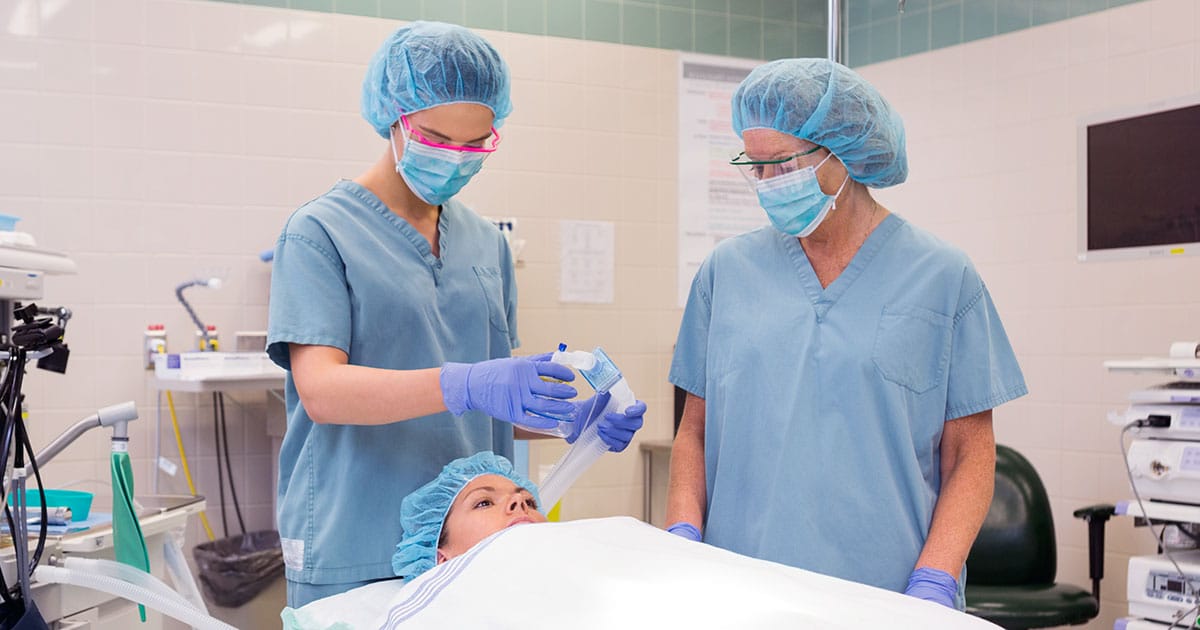Extend your clinical practice capabilities around nursing care for surgery patients.

Overview
A Graduate Certificate in Perioperative Nursing refines your clinical decision-making and enhances communication skills in operating theatres. This course trains you for the structured and meticulous world of surgery, focusing on patient care during their unconscious state and in the critical transition periods before and after operations.
Available online and part-time, the program fits well for nurses already working in surgical services. You can complete the four modules within eight months, usually without the need for exams, allowing you to balance work and study effectively.
Earning this qualification opens doors to advanced roles, such as Senior Registered Nurse, Clinical Nurse Specialist, or Clinical Nurse Consultant. Graduates normally qualify for a qualifications allowance, typically adding $3k or more to annual pay.
About this Course
A Graduate Certificate in Nursing (Perioperative) is intended for clinicians with experience in surgery-related roles, such as Anaesthetic, Circulating, Instrument, Recovery, and Day Surgery Nursing. The course provides specialised training across these key areas, building upon your existing skills gained from a general nursing degree and practical experience in the surgical environment.
Key takeaways
- For RNs experienced in perioperative roles.
- Level 8 postgraduate qualification.
- Four subjects, extendable to a 12-subject masters.
- Focus on safety, surgical techniques, and processes.
- Should offer electives for targeted learning.
A Graduate Certificate in Nursing is a well-recognised postgraduate university qualification. It is rated at Level 8 in the Australian Qualifications Framework – above a bachelor degree (Level 7) and below a master's degree (Level 9). Graduate certificates are commonly part of pay agreements for nurses, with graduates eligible for Qualification Allowances.
A perioperative nursing course centres on essential skills like patient safety and advanced clinical techniques related to surgery. It blends core perioperative principles with a choice of electives. Students benefit from a flexible program, gaining knowledge useful to all surgery nurses as well as targeted instruction for specific roles.
Examples: Australian Catholic University, Australian College of Nursing
What Does a Perioperative Nurse Do?

Perioperative nurses in Australia engage in a range of roles across the surgical process, covering preoperative, intraoperative, and postoperative stages.
- In the preoperative phase, Day Surgery Nurses prepare and assess patients for surgery, communicating vital information and ensuring readiness for the procedure. Anaesthetic Nurses set up and manage anaesthetic equipment, assist anaesthetists, and focus on patient comfort and safety during the operation.
- During the surgery, Circulating Nurses manage operating room activities, assist the sterile team, and ensure patient safety. They handle surgical procedures and any intra-operative complications. Instrument Nurses, also known as Scrub Nurses, set up sterile instruments and supplies, support surgeons during the operation, and maintain aseptic conditions in the operating room.
- After surgery, Recovery Nurses, or Post Anaesthesia Care Unit (PACU) Nurses, oversee the patient's recovery from anaesthesia. They perform assessments and manage post-operative care, focusing on pain management and smooth transition to post-surgery recovery.
Each role is crucial to the safety and success of surgical procedures, from preparation to recovery.
Related: What Is Perioperative Nursing in Australia?
How Do I Become a Perioperative Nurse?

To become a Perioperative Nurse, start with a foundational nursing degree. Then gain experience in a perioperative environment and do advanced studies.
- First, obtain a Bachelor of Nursing. If you have a degree in another field, consider a master's degree in nursing practice.
- After your degree, register with the Nursing and Midwifery Board of Australia (NMBA). Then, work for at least a year as a Registered Nurse, ideally in surgical care.
- Finally, study for further qualifications. Complete a postgraduate course in advanced clinical practice, obtaining Nursing Certification, a Graduate Diploma of Nursing, or a Masters of Nursing.
While registered nurses or trained enrolled nurses can work in this field, certain positions require specific experience and postgraduate qualifications.
Related: Postgraduate Nursing Courses Online
Average Annual Salary

In Australia, a perioperative registered nurse earns, on average, $86,861 per year, or about $43.81 per hour. For those just starting in the field, entry-level salaries begin at approximately $72,118 annually. More experienced clinical nurses can earn up to $107,382 per year.
Contrary to some expectations, working specifically in this field, such as in operating room or surgery jobs, doesn't automatically lead to higher wages. These figures represent the general average for nurse pay rates, regardless of the specific discipline.
Nurses' salaries in Australia increase with experience and advanced qualifications. Advancing to roles like Clinical Nurse Specialist, Clinical Nurse Educator, or Clinical Nurse Consultant is possible.